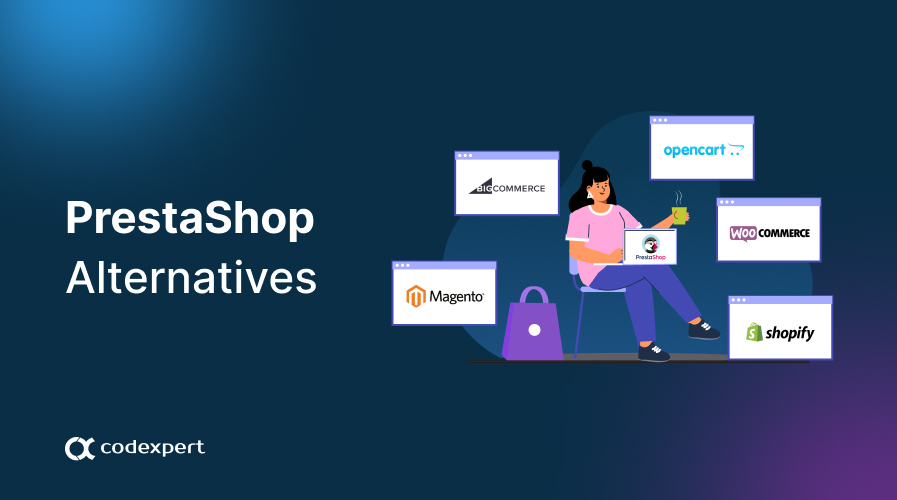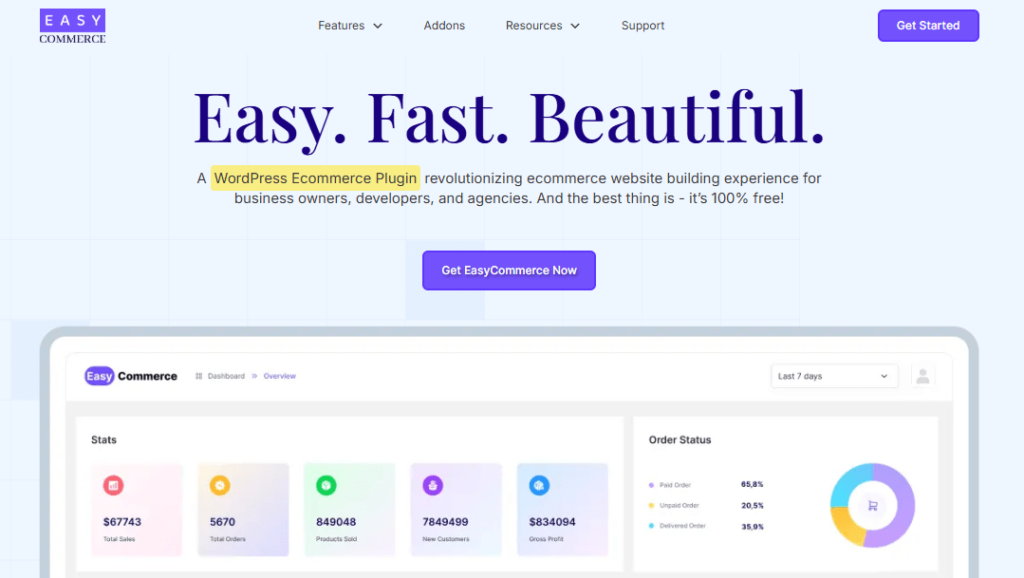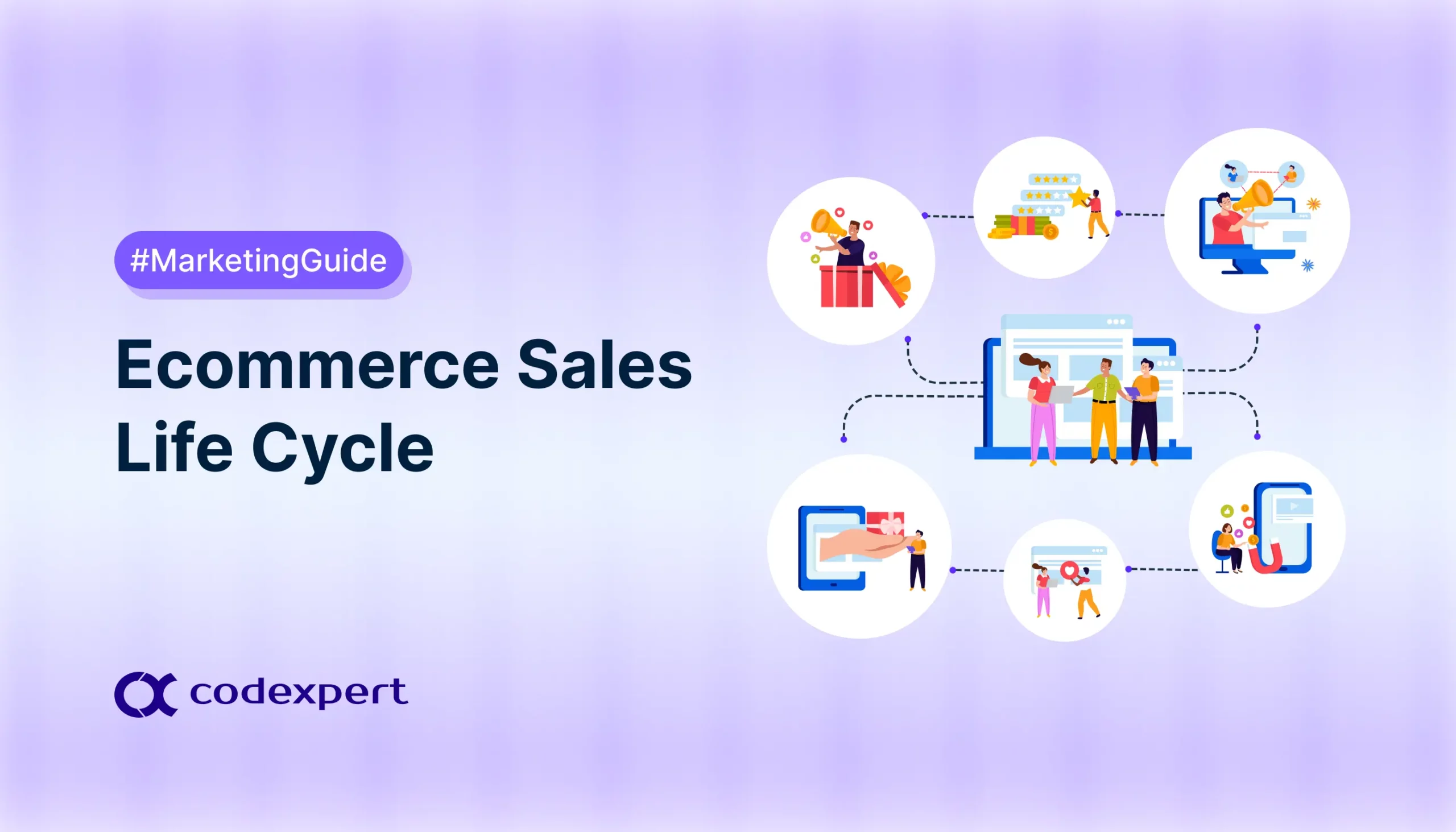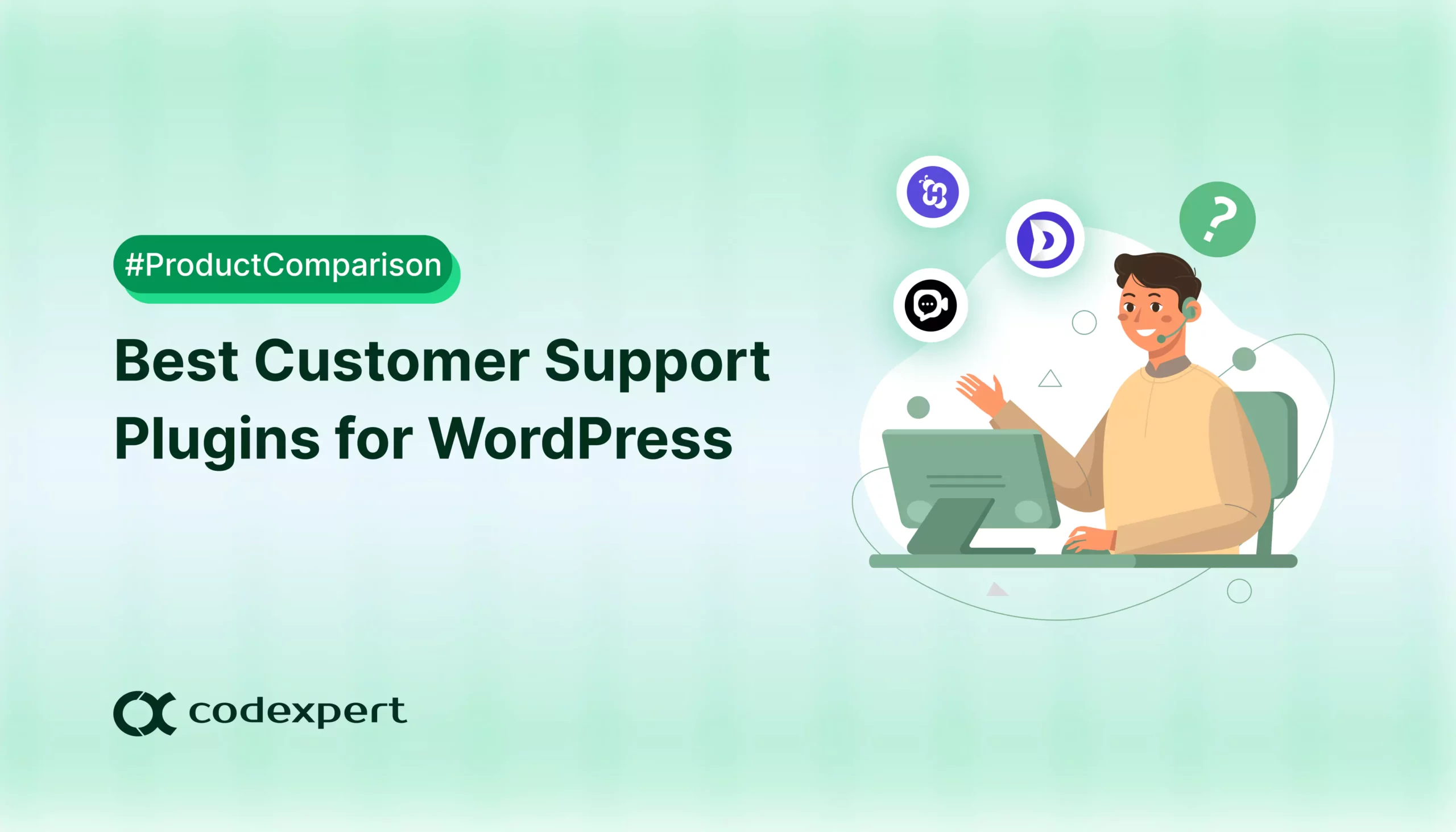7 Best PrestaShop Alternatives in 2025

PrestaShop powers more than 300,000 online stores, making it a popular choice among online retailers. However, with many alternative platforms available—each offering its own unique features—it’s important to carefully weigh all your options to determine the best fit for your online store.
With hundreds of PrestaShop alternatives available today, it’s important to recognize that your store has unique needs that may not be fully met by relying on just one platform. This blog will explore the top alternatives in the industry to find the one that best fits your needs.
To get started, let’s look at the most common alternatives and what they’re best used for –
- EasyCommerce: Best overall
- WooCommerce: Best for WordPress users.
- Shopify: Best for ease of use and scalability.
- BigCommerce: Best for enterprise features.
- Ecwid: Best for quick setup and integration.
- Adobe Commerce (Magento): Best for advanced customization.
- OpenCart: Best for cost-effective flexibility.
PrestaShop Alternatives: A Quick Summary
| Feature | EasyCommerce | WooCommerce | Shopify | BigCommerce | Ecwid | Adobe Commerce | OpenCart |
| Pricing | Free (plugin) | Free (plugin) | Starts $39/month | Starts $39/month | Free/$15+/month | Quote-based | Free (self-hosted) |
| Ease of Use | Very easy | Easy | Very Easy | Easy | Easy | Complex | Moderate |
| Hosting | Self-hosted | Self-hosted | Hosted (SaaS) | Hosted (SaaS) | Hosted/Self-hosted | Self-hosted | Self-hosted |
| Customization | High | High (with plugins) | Limited | Moderate | Moderate | Very High | High |
| Payment Options | Many (plugins) | Many | Limited (Built-in) | Many (built-in) | Moderate | Extensive | Many |
| Best For | Small/medium stores | WordPress users | Small/medium stores | Medium/large stores | Small businesses | Large enterprises | Developers |
| Multilingual | Yes | Yes (plugins) | Yes (Limited) | Yes | Yes (Paid) | Yes | Yes |
| Scalability | High | Moderate | High | High | Moderate | Very High | High |
| Support | Official/ Community | Community | 24/7 (Paid) | 24/7 (Paid) | 24/7 (Paid) | Premium support | Community/paid |
| SEO Capabilities | Better | Moderate | Good | Very Good | Limited | Excellent | Good |
| Security | Maximum | Dependent (WordPress) | Very High (Built-in) | High (Built-in) | Moderate | Very High | Moderate |
| Mobile-friendly | Yes | Yes (responsive) | Yes | Yes | Yes | Yes | Yes |
| Interface | Intuitive | Basic | Intuitive | Basic | Intuitive | Basic | Basic |
7 PrestaShop Alternatives: A Detailed Comparison
1. EasyCommerce

We’ve found EasyCommerce to be the leading alternative to PrestaShop. Built on the WordPress CMS, it was designed to solve the common challenges ecommerce store owners face. Compared to PrestaShop, it stands out with superior performance, scalability, customization options, lower add-on costs, better support, and more.
The best part? Despite all these advantages, EasyCommerce’s core plugin remains completely free, with no hidden charges. This gives small to medium stores an advantage of growing without fearing costs going sky high. Plus adds a seamless user experience without slow loading times, cluttered layouts, or complex navigation.
Another key advantage of EasyCommerce is the freedom it provides over data control. Unlike hosted platforms that limit access to crucial business data, EasyCommerce ensures you retain full ownership of your store’s and customers’ data, giving you complete control over how it’s managed and utilized.
What Are the Pros?
- Open Source: EasyCommerce, being an open-source platform sets no absolute limit on things you can customize your online store with.
- Easy Use: Users love EasyCommerce for its effortless setup and intuitive design, making it incredibly easy to get started.
- 24/7 Customer Support: Even though the plugin is freely accessible, it offers premium-level customer support to every user.
- Minimal Maintenance: EasyCommerce requires less monitoring, letting users focus on business instead of technical hassles.
What Are the Cons?
- Not Enterprise-Ready: EasyCommerce is still evolving and not yet suited for enterprise-level use.
Price
The core plugin is free to download, install, and use. Optional add-ons may require payments to avail.
2. WooCommerce

As a WordPress-based e-commerce platform, this open-source plugin was launched in 2011 and quickly gained massive popularity within the industry. WooCommerce garnered its larger-than-life user base due to its user-friendly interface and no-code customization.
Using all the default WordPress features and seamlessly integrating with the ecosystem, it automatically becomes one of the top choices for e-commerce business owners. With a wide range of plugins and customization options available, you can easily build the perfect online store and tailor it to your needs.
As an open platform, WordPress offers complete control over both your website and e-commerce shop, empowering you to create a truly unique and flexible experience.
What Are the Pros?
- Completely Free: WooCommerce is entirely free. No matter how much you extend your business, there is no hassle about upgrading plans or counting extra fees.
- User-Friendly: WooCommerce has a straightforward interface and an intuitive dashboard that provides easy navigation. The drag-and-drop feature makes the whole process even more accessible.
- Detailed Sales Report: WooCommerce provides a detailed sales report that will help you understand your business growth.
- SEO Friendly: WooCommerce has built-in SEO tools, so you can gain organic traffic to your website.
What Are the Cons?
- Security Liabilities: You must manage all your security issues yourself, which can be complex when managing a large store with high traffic.
- Scalability Issues: Managing large online stores can slow down the performance of your website.
- Higher Learning Curve: WooCommerce has a significant learning curve. You need to invest time and effort in choosing the right extensions.
Price
WooCommerce is entirely free.
3. Shopify

Shopify is a comprehensive platform with a powerful suite of features and tools. It holds 10.32% of the total e-commerce market share, and it gives you complete control over your website in creating a fully customized online store. You can control everything from sales to financing, directly from the site’s back-end.
One major advantage of Shopify is its lightning-fast hosting, which enables you to sell a wide range of products without relying on third-party services. Combined with its powerful built-in features and dedicated customer support, Shopify stands out as an excellent alternative to PrestaShop.
What Are the Pros?
- Unlimited Hosting: Shopify offers unlimited hosting service in all their plans, ensuring a super fast website every time.
- Seamless Integration: Shopify seamlessly integrates with all the other platforms, making it easy to navigate and organize.
- Simple Admin Management: Shopify admin management is simple, giving you full control over your shop and team’s management.
What Are the Cons?
- No Free Plan: Shopify offers no free plan for you to try out. So, you can’t demo Shopify features before launching your shop.
- Difficulty in Migration: Migrating from Shopify to any other platform is complicated. You may need to rebuild your store from scratch.
- Limited Customization: Shopify allows extensions only from its marketplace, which can result in limited customization for some users.
Price
Shopify does not offer free plans, but a 3-day trial is available. The premium plans start at $25/month and can go up to $2300/month.
4. BigCommerce

BigCommerce is an all-in-one e-commerce platform that provides everything you need to build and manage an online store. From hosting to design tools, BigCommerce offers a comprehensive solution, so you don’t have to worry about finding separate hosting providers, additional software, or managing security concerns — everything is handled for you.
Setting up an online store with BigCommerce is quick and easy, and it allows customers to pay using their preferred payment gateway. One of the standout benefits of BigCommerce is that as your store grows, you’ll pay fewer transaction fees.
With all the features and inclusiveness, BigCommerce stands out as a leading e-commerce platform for businesses of all sizes.
What Are the Pros?
- Comprehensive: BigCommerce offers extensive features to manage and customize your store. There is no need to have additional extensions.
- Simple Multi-currency Selling: BigCommerce simplifies multi-currency selling, which will attract global customers to your store.
- Real-time Shipping Calculation: This platform shows a real-time shipping calculator, which makes it very convenient to determine a product’s cost.
- Cookie Consent: BigCommerce integrates a built-in cookie consent feature for GDPR compliance.
What Are the Cons?
- Forced Plan Upgrade: Once your sales exceed, you must upgrade to a newer plan, which can be inconvenient to some.
- No Shipping Discounts: BigCommerce offers no shipping discounts, unlike other alternatives.
Price
BigCommerce does not offer any free plan; the paid plans start with a standard plan costing $39/month and end with a pro plan costing $399/month.

Ecwid is a powerful WordPress plugin for building simple online stores. It supports selling a wide range of products and integrates seamlessly with multiple platforms. With Ecwid handling all security aspects, you can focus on managing your store without worrying about security issues.
This platform is excellent for all types of businesses because of its comprehensive set of features and ease of use. With its user-friendly interface, extensive customization options, and powerful marketing tools, Ecwid has emerged as a top e-commerce plugin.
One of its standout features is its separate dashboard, which keeps your workflow more focused and streamlined, independent of WordPress.
What Are the Pros?
- Multi-channel Sell: Ecwid integrates seamlessly with multiple channels, such as Facebook and Instagram, allowing access to a much larger audience.
- Built-in Marketing Tools: It has built-in marketing tools to expedite your marketing efforts.
- Available Mobile App: Ecwid has an e-commerce mobile app that allows you to manage your online store easily via most devices.
- Automatic Tax Calculation: Ecwid lets you calculate tax automatically, which is convenient when deciding on product prices.
What Are the Cons?
- Limited product variety: Ecwid has a limited product variety that is not suitable for complex online stores.
- Restricted SEO: SEO is restricted in Ecwid, and you need external extensions for advanced SEO optimization.
Price

Adobe Commerce is a sophisticated e-commerce platform created with developers in mind. It offers two versions—one of which is completely free, which makes it accessible for those just starting out.
Unlike many other platforms, Adobe Commerce is particularly well-suited for users with advanced technical skills. It integrates effortlessly with various payment gateways and offers a range of extensions which enables you to expand on its capabilities even further.
Adobe Commerce (Magento) also comes with extensive customization opportunities and all the tools Adobe has to offer. For anyone looking for a customized online store experience, this is the platform to get you started.
What Are the Pros?
- Flexibility and Adaptability: Adobe Commerce offers high adaptability and flexibility with all the platforms.
- Built-in SEO: Adobe Commerce has built-in SEO capabilities essential for generating organic traffic in your online store.
- Extensive Customization: This platform integrates with all the other Adobe resources, enabling extensive customization for your online store.
- Sophisticated Tools: Adobe Commerce (Magento) has sophisticated tools that are great for developers.
What Are the Cons?
- Not for Beginners: Adobe Commerce is absolutely not for beginners. You need sound technical expertise to operate and generate a store on this platform.
- Expensive in the Long term: Flourishing in this platform will be expensive due to the cost of expanding features.
Price
Adobe Commerce has two variations: one is completely free, and another costs $1,988/year to $2,688/year.
7. OpenCart

OpenCart, launched in 1999, is a versatile platform that allows users to create professional, modern websites for free. It offers a wide range of extensions and customization options, which makes it easy to build user-friendly websites tailored to your vision.
While OpenCart lets you start and run a full-fledged online business, more complex websites may require the assistance of a developer. Start your online journey with OpenCart today and grow your business over time.
What Are the Pros?
- Easy Setup: OpenCart setup is straightforward and hassle-free. Users with minimal technical knowledge can jumpstart their business here.
- Multilingual and Currency: OpenCart provides multilingual support and multi-currencies to turn your online store into a merchandising store that attracts global customers.
- Unlimited Products: OpenCart lets you add unlimited products for free, which makes it a greatly scalable platform.
What Are the Cons?
- Customer Support: OpenCart does not offer customer support, which can be stressful when you’re faced with errors during setup.
- Limited Add-ons: Compared to other options, this platform has limited add-ons, so customization remains limited in OpenCart.
Price
This is an open-source platform, and you only need to pay for hosting.
Choosing the Right Option
Now that you’re aware of the seven industry-leading PrestaShop alternatives, how would you select the best one? Here are five tips for choosing a suitable PrestaShop alternative for your business.
- Business Size and Goals: Different platforms serve different business sizes. If you’re running a small business, platforms like EasyCommerce or Ecwid might work better because they’re affordable and easy to use.
For larger businesses with complex needs, platforms like Adobe Commerce (Magento) or BigCommerce can provide powerful tools for scaling and handling heavy traffic.
- Ease of Use and Technical Expertise: If you’re not a developer or don’t want to hire one, you’ll want an easy-to-use platform. EasyCommerce and BigCommerce are known for their simplicity and require no technical skills.
PrestaShop, OpenCart, and Adobe Commerce are more developer-friendly, offering greater customization but with a steeper learning curve.
- Hosting and Maintenance: Some platforms like Shopify and BigCommerce offer a fully hosted service, meaning they manage everything from hosting to security. These options are perfect if you don’t want to worry about maintaining your server or updating software.
- Check Costs and Pricing Structure: It’s essential to consider the upfront costs and on-going fees, transaction fees, and costs for additional features. WooCommerce is free, but you must pay to host plugins and other services.
Shopify and BigCommerce have monthly payments but include many built-in tools. Adobe Commerce tends to be the most expensive but offers high-level customization and features for enterprises.
- Customization and Extensibility: Customization is crucial if you want a store that matches your unique branding or offers specific features.
Platforms like Adobe Commerce, EasyCommerce, and PrestaShop are highly customizable with thousands of themes and plugins, making them ideal if you need specific functionalities. Shopify and BigCommerce offer more limited customization, though they still provide flexibility through apps.
Bottom Line
PrestaShop is a great e-commerce platform that you can use with WordPress or as a separate platform. However, e-commerce platforms are not one size fits all, so you need to explore to find the absolute solution. PrestaShop lacks various features, which is why we’ve listed the perfect alternatives for you.
Go through all the pros and cons of each platform before jumping to a conclusion, and there you have the perfect alternatives to PrestaShop.
Frequently Asked Questions (FAQs)
Q1. Can I migrate my store from PrestaShop to another platform easily?
Migrating from PrestaShop to another platform depends on the alternative you choose. Some platforms offer dedicated migration tools or services to transfer products, customer data, and orders.
However, complex migrations may require a developer’s assistance, especially if your store has custom features or large databases. Research whether the alternative supports seamless integration or offers third-party migration services.
Q2. How do customization options compare when switching from PrestaShop?
Customization flexibility varies significantly between platforms. While PrestaShop allows deep customization due to its open-source nature, some alternatives might have limitations in terms of modifying the core code or design.
Consider how much control you need over design, functionalities, and integrations and whether the new platform offers enough customization without requiring significant coding skills.
Q3. What should I consider regarding SEO when choosing an alternative?
If SEO is critical to your business, ensure the platform you switch to offers strong SEO capabilities. Look for features such as customizable URLs, meta tags, sitemaps, and mobile optimization.
Also, some platforms provide better SEO plugins and integrations than others. Evaluate how the platform handles on-page SEO elements and whether it effectively supports your long-term SEO strategy.
Q4. Are there any long-term scalability issues with other platforms compared to PrestaShop?
Scalability is crucial, especially if you expect your store to grow significantly. While PrestaShop is scalable due to its open-source nature, some alternatives may limit scalability due to higher costs, feature limitations, or traffic thresholds.
Consider the platform’s ability to handle a growing product catalog, increasing traffic, and additional integrations without performance degradation or substantial cost increases.
Subscribe to Our Newsletter
Get the latest WordPress tutorials, trends, and resources right in your inbox. No Spamming, Unsubscribe Anytime.

Thank you for subscribing to our newsletter!
Table of Content
- PrestaShop Alternatives: A Quick Summary
- 7 PrestaShop Alternatives: A Detailed Comparison
- 1. EasyCommerce
- What Are the Pros?
- What Are the Cons?
- Price
- What Are the Pros?
- What Are the Cons?
- Price
- What Are the Pros?
- What Are the Cons?
- Price
- What Are the Pros?
- What Are the Cons?
- Price
- What Are the Pros?
- What Are the Cons?
- Price
- What Are the Pros?
- What Are the Cons?
- Price
- What Are the Pros?
- What Are the Cons?
- Price
- Choosing the Right Option
- Bottom Line
- Frequently Asked Questions (FAQs)













